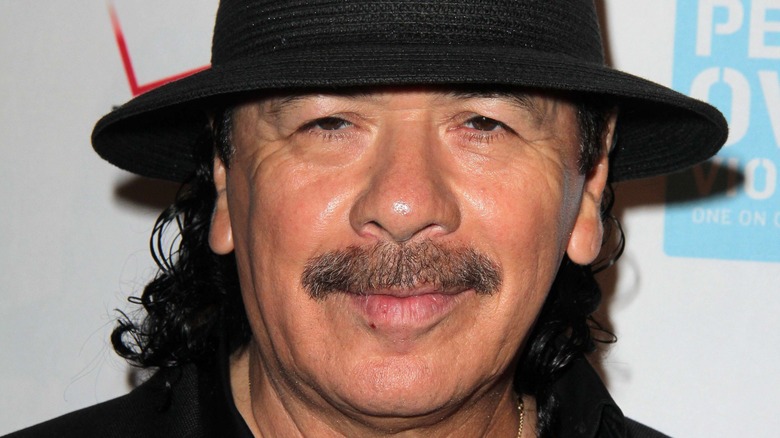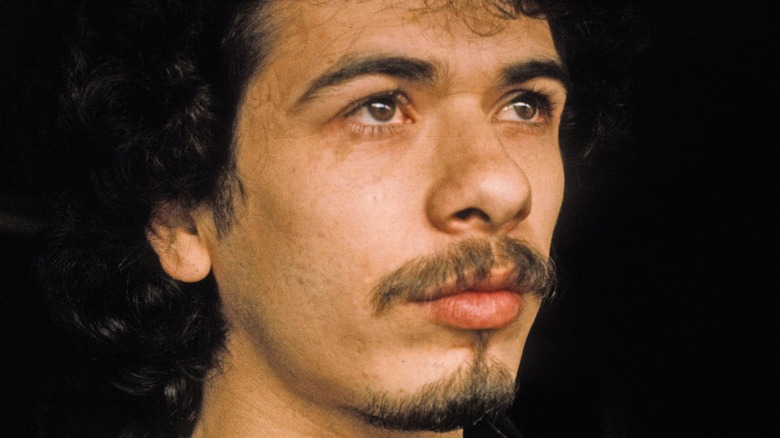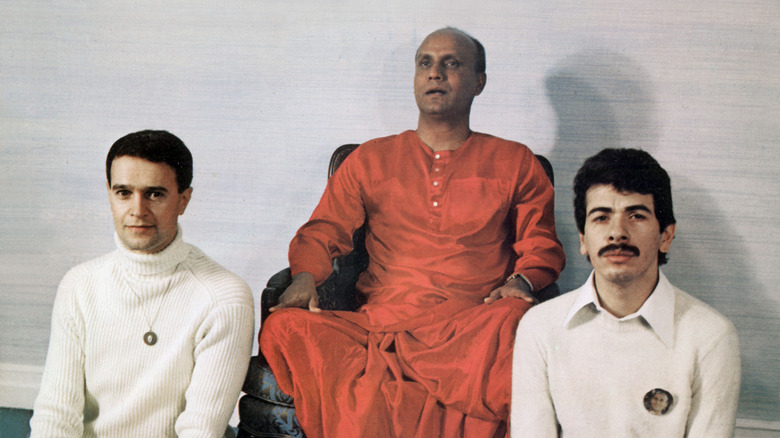Was Carlos Santana Under The Spell Of A Cult Leader For Almost A Decade?
Carlos Santana has been a rock 'n' roll icon his entire adult life. He's such a well-known and well-loved member of today's classic rock and pop landscape that it's shocking to discover that at one point, Santana spent quite a long time following the teachings of a man many have declared to be a cult leader, even going to far as to change his name. Born July 20, 1947, in Autlan de Navarro, Mexico, per Britannica, Santana began playing the violin at the age of 5 before switching to guitar at 8. He started playing in bands in Tijuana as a teen, where his exposure to local music as well as American blues from the likes of B.B. King and T-Bone Walker paved the way for his future as a fusion artist who combined various influences and traditions into an innovative sound all his own.
He started the Santana Blues Band in 1966 after his family relocated to San Francisco, California and caught the attention of music promoter Bill Graham, who booked the group to play at the legendary Fillmore West club. They were relatively unknown outside of San Francisco when they played at Woodstock in 1969, but were a crowd favorite, and the single "Evil Ways," off their debut self-titled album reached number four on the American charts. The next year, the band released the album "Abraxus," featuring two signature songs, "Black Magic Woman" and "Oy Como Va," both of which reached No. 1.
A peaceful guru or a cult leader?
In a 2000 interview with Rolling Stone, Carlos Santana discussed how after years of chart-topping success, he fell in with a man who would turn out to have nefarious purposes and methods behind his supposed spiritual guidance. Santana had been studying Eastern mysticism and philosophy, inspired by jazz legend John Coltrane, who had done the same, as well as fasting and praying, seeking out some sort of higher power or spiritual breakthrough. When he saw a photograph of Eastern guru Sri Chinmoy, he recognized a look of peace in the man's demeanor and was attracted to and inspired by one of his sayings: "When the power of love replaces the love of power."
In 2009, Forbes ran a review of Jayanti Tamm's memoir "Cartwheels In A Sari" in which she discussed growing up in Sri Chinmoy's cult. Chinmoy arranged her parents' marriage but instructed them to practice abstinence. When Tamm was born, he explained her birth as a miracle and proclaimed that she was the "Chosen One," meant to be his most loyal follower.
Sri Chinmoy's questionable leadership
Chinmoy forbade his followers from watching most television, consuming alcohol, caffeine, and meat, dancing, having sex and dating, socializing with non-followers, and owning pets, according to Tamm told Forbes. Formal education was also discouraged and Tamm instead spent time memorizing Chinmoy's sayings and songs.
She also described how the supposed guru charged $25 for a rundown of what he deemed their personality defects. Another move of Chinmoy's was to pit his followers against one another, creating what Forbes described as a "caste system." People were even told to spy on each other and turn in followers who broke his rules. He would elevate or demote members standing in the group whenever it suited him.
Carlos Santana described similarly harrowing and bizarre situations that occurred during his time following Sri Chinmoy. Rolling Stone reported that in interviews from the time Santana was still under Chinmoy's sway, even going so far as to go by the new name assigned to him, Devadip, he would rave about the guru; at one point he enthused "Guru has graduated from the many Harvards of consciousness and sits at the seat of God. I'm still in kindergarten."
Insulting Billie Jean King was the final straw
In the 2000 Rolling Stone interview, Carlos Santana recalled the strict rules: "Cut your hair, no drugs, total vegetarian. It was like a West Point approach to spirituality. Five o'clock in the morning meditating, every day."
Santana's wife Deborah noted that Chinmoy was interested in long-distance running and how this became a way for followers to compete against one another: "There was always this competition in how much we could do to prove our devotion — who could sleep the least and still function, because you were working so hard, how many miles could you run. I once ran a 47-mile race. It wasn't enough just to run a marathon."
Eventually, Carlos and Deborah realized that the bizarre and abusive treatment Sri Chinmoy meted out to his followers outweighed any spiritual benefits and left the group in 1981. The final straw was overhearing Chinmoy insulting tennis player Billie Jean King because she was in a romantic relationship with a woman. "This guy's supposed to be spiritual after all these years; mind your own spiritual business and leave her alone," said Santana.



